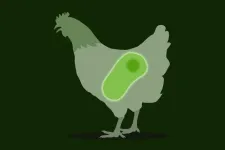(Press-News.org) A research team has decoded the genome of historic potato cultivars and used this resource to develop an efficient method for analysis of hundreds of additional potato genomes.
Potatoes are a staple food for over 1.3 billion people. But despite their importance for global food security, breeding successes have been modest. Some of the most popular potato cultivars were bred many decades ago. The reason for this limited success is the complex genome of the potato: there are four copies of the genome in each cell instead of just two. This challenges traditional hybridization-based breeding. A team led by Professor Korbinian Schneeberger, head of the Genome Plasticity and Computational Genetics research group at LMU and the Max Planck Institute for Plant Breeding Research, has now made an important breakthrough. As the researchers report in the renowned journal Nature, they were able to reconstruct the genome of ten historic potato cultivars. They then used this knowledge to develop a method that would make it much easier and faster to reconstruct further potato genomes.
In collaboration with researchers from Wageningen University, the Leibniz Institute of Plant Genetics and Crop Plant Research (IPK) in Groß Lüsewitz, and the Xi’an Jiaotong University in China, the team selected historical varieties, some of which were already cultivated in the 18th century. “Since these potatoes come from a time when European breeding programs were beginning, we wanted to figure out how much diversity exists in these potatoes in order to understand the genetic potential of our potatoes,” says Schneeberger. The answer was: not very much. The genetic pool of the potato is extremely limited. The ten potato varieties covered around 85 percent of the genetic variability of all modern European potatoes.
Bottleneck effects after introduction from South America
The researchers attribute their findings to bottleneck effects. Potatoes were imported from South America from the 16th century onward. The number of different individuals was low and most were unable to cope with the European conditions. This reduced gene pool was then further reduced by diseases. The most famous example is the potato late blight outbreak of the 1840s, which caused harvests to collapse and led to catastrophic famines, most notably in Ireland but also in the rest of Europe.
At the same time, the study revealed – to the surprise of the researchers – that the differences between individual chromosome copies can be huge. “Because the gene pool is so limited, there aren't many different chromosomes, but when the chromosomes do differ, they diverge to an extent never before observed in domesticated plants,” explains Schneeberger. “The differences are about twenty times greater than in humans.” These differences presumably arose before the arrival of the potato in Europe. The indigenous peoples of South America started to domesticate potatoes about 10,000 years ago, and the differences are likely the result of crossing between wild species.
Finally, the researchers developed a novel approach that can be used to analyze the genomes of the around 2,000 potatoes registered with the European Union. Instead of laboriously generating the data needed to reconstruct a genome, easily generated data are compared with the currently known genomes to determine which of the known chromosomes are present in a cultivar. The researchers showed that their approach works with the Russet Burbank cultivar, which has existed since 1908 and is still the standard variety for French fries to day. “Knowledge of genome sequences forms the basis for many approaches in plant breeding, from traditional breeding to the latest methods of genome engineering,” says Schneeberger. “In future, we won’t have to work without this information anymore.”
END
European potato genome decoded: Small gene pool with large differences
2025-04-17
ELSE PRESS RELEASES FROM THIS DATE:
Nontraditional risk factors shed light on unexplained strokes in adults younger than 50
2025-04-17
Research Highlights:
Among adults ages 18-49 (median age of 41 years) who were born with a hole in the upper chambers of their heart known as patent foramen ovale (PFO), strokes of unknown cause were more strongly associated with nontraditional risk factors, such as migraines, liver disease or cancer, rather than more typical factors such as high blood pressure.
Migraine with aura was the top factor linked to strokes of unknown causes, also called cryptogenic strokes, especially among women.
Embargoed ...
Extreme drought contributed to barbarian invasion of late Roman Britain, tree-ring study reveals
2025-04-17
Three consecutive years of drought contributed to the ‘Barbarian Conspiracy’, a pivotal moment in the history of Roman Britain, a new Cambridge-led study reveals. Researchers argue that Picts, Scotti and Saxons took advantage of famine and societal breakdown caused by an extreme period of drought to inflict crushing blows on weakened Roman defences in 367 CE. While Rome eventually restored order, some historians argue that the province never fully recovered.
The ‘Barbarian Conspiracy’ of 367 CE was one of the most severe threats to Rome’s hold on Britain since the Boudiccan revolt three centuries earlier. Contemporary sources indicate that components ...
Antibiotic-resistant E. albertii on the rise in Bangladeshi chicken shops
2025-04-17
If you have ever chickened out of eating chicken, your unease may not have been unreasonable.
Osaka Metropolitan University researchers have detected alarming rates of Escherichia albertii, an emerging foodborne pathogen, in retail chicken meat in Bangladesh. Their findings show extensive contamination and significant antimicrobial resistance, underscoring the potential risks to public health.
E. albertii is a less known but probably not less dangerous relative of E. coli. First described in Bangladesh in 2003, this bacterium ...
Veterinary: UK dog owners prefer crossbreeds and imports to domestic pedigree breeds
2025-04-17
The UK pedigree dog population shrank by a yearly decline of 0.9% between 1990 and 2021, according to research published in Companion Animal Genetics and Health. The study highlights a rise in the populations of crossbreeds and imported pedigree dogs since 1990, but finds that only 13.7% of registered domestic pedigree dogs were used for breeding between 2005 and 2015.
There are more than 400 breeds of dogs globally, characterised by different appearances and behaviours. While the overall population of pet dogs in the UK ...
Study links climate change to rising arsenic levels in paddy rice, increasing health risks
2025-04-16
Climate change may significantly impact arsenic levels in paddy rice, a staple food for millions across Asia, reveals a new study from Columbia University’s Mailman School of Public Health. The research shows that increased temperatures above 2°C, coupled with rising carbon dioxide (CO2) levels, lead to higher concentrations of inorganic arsenic in rice, potentially raising lifetime health risks for populations in Asia by 2050. Until now, the combined effects of rising CO2 and temperatures on arsenic accumulation in rice have not been studied in detail. The research done ...
Study indicates that risky surgery after a stroke due to carotid artery stenosis is no longer necessary for majority of patients
2025-04-16
European research led by University College London (UCL), together with Amsterdam UMC and the University of Basel shows that a significant proportion of patients who suffer a stroke due to carotid artery narrowing can be treated with medication only. A risky carotid artery operation, currently still the standard treatment for many patients, may then no longer be necessary for this group of patients. This research, published today in the Lancet Neurology, may lead to the global guidelines for the treatment of these patients being adjusted.
In the Netherlands, about 2,000 people with carotid artery stenosis ...
Blood pressure: New research shows a changing climate may jeopardise global blood supply
2025-04-16
Blood pressure: New research shows a changing climate may jeopardise global blood supply
A new study published in The Lancet Planetary Health suggests a changing climate threatens the continuous availability of safe blood across the world.
Researchers at the University of the Sunshine Coast and Australian Red Cross Lifeblood say health issues, the spread of infectious disease and extreme weather exacerbated by climate change will impact the ability of people to donate, and at the same time may trigger a rise in the need for blood.
Lifeblood researcher and UniSC Adjunct Research Fellow Dr Elvina Viennet said this ...
Start of US hunting season linked to increased firearm incidents, including violent crimes and suicide
2025-04-16
The start of deer hunting season in the US - when firearms and ammunition are more available in certain states - is associated with increases in both hunting and non-hunting related firearm incidents, including violent crime and suicide, finds a study published by The BMJ today.
While increases in hunting related incidents are to be expected at this time, increases in non-hunting related firearm incidents “indicate the potential general effect of greater firearm availability on different ...
New system could help reduce unnecessary surgery to prevent strokes
2025-04-16
Researchers at UCL have tested a new scoring system to measure the risk of stroke in patients with narrowed arteries due to atherosclerosis, which could prevent unnecessary surgeries and stents.
Atherosclerosis is a condition where the blood vessels become narrowed and hardened due to the buildup of plaque, including in the carotid arteries, which carry blood from the heart to the brain. Atherosclerosis can lead to serious health problems like strokes and heart attacks.
Atherosclerosis is a very common condition that can affect anyone, particularly those over the age of 65, smokers and people with a high cholesterol, hypertension or family ...
Strongest hints yet of biological activity outside the solar system
2025-04-16
Astronomers have detected the most promising signs yet of a possible biosignature outside the solar system, although they remain cautious.
Using data from the James Webb Space Telescope (JWST), the astronomers, led by the University of Cambridge, have detected the chemical fingerprints of dimethyl sulfide (DMS) and/or dimethyl disulfide (DMDS), in the atmosphere of the exoplanet K2-18b, which orbits its star in the habitable zone.
On Earth, DMS and DMDS are only produced by life, primarily microbial life such as marine phytoplankton. While an unknown chemical process may be the source of these molecules in K2-18b’s atmosphere, the results are ...


